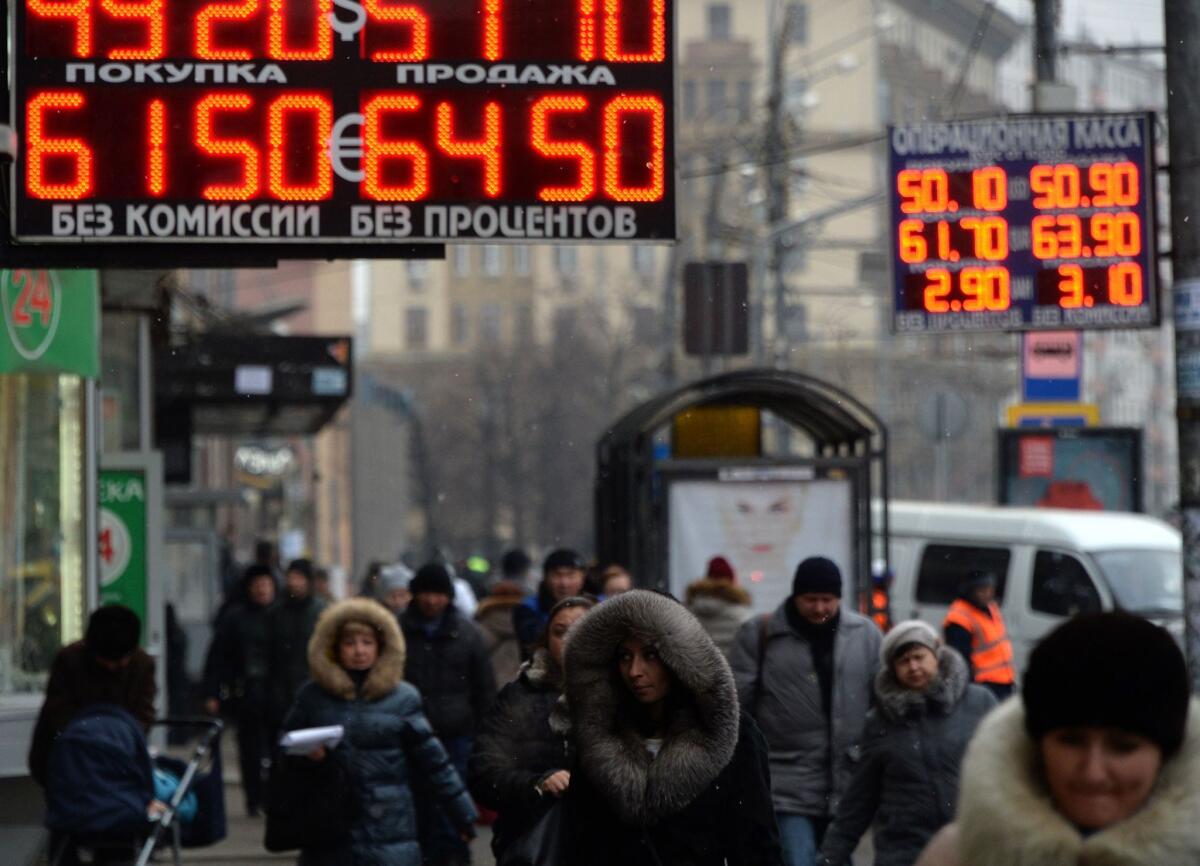Russian ruble hits record low as oil slump, sanctions hit home

Reporting from Moscow â The Russian ruble hit a record low Monday as the countryâs economy continued to reel from the combined effect of slumping oil prices and international sanctions.
The value of the currency slid to close to 54 rubles to the U.S. dollar at the Moscow hard currency exchange.
The decline stopped only after the Bank of Russia reacted with a massive dollar intervention in the afternoon.
A bank official called the situation âcomplicated,â the Interfax news agency reported.
âWe should admit the economic situation is complicated but not critical,â said Kseniya Yudayeva, a Bank of Russia first deputy chief, addressing a seminar of regional officials in Moscow on Monday. âThe main problem we face today is a decrease in investments. Business needs certain time to review its investment plans in connection with new realities.â
Yudayev linked the dramatic decline to falling oil prices and said Russia was bracing for further drops in the price of oil to $60 a barrel in the near future.
Last month, Finance Minister Anton Siluanov blamed international sanctions as well as slumping oil prices for the countryâs economic woes, saying that together they were costing Russia well over $140 billion annually, including capital flight of $130 billion a year.
Experts blame Russiaâs aggressive foreign policy and especially its involvement in eastern Ukraineâs armed conflict.
âEverything we have seen in our foreign policy this year has been a political mistake invariably leading to economic woes,â Konstantin Sonin, deputy director of the Moscow-based Higher School of Economics, said in an interview. âEspecially outrageous was the decision to hit the West with counter-sanctions banning Western foodstuffs, which made absolutely no economic sense and reason and hit the ordinary Russian consumer worse than Western producers and importers.â
The so-called Western food embargo imposed by Russia on Aug. 7 in response to Western economic sanctions over Ukraine has cost Russian consumers close to $1 billion, a recent study conducted by the Institute of Strategic Analysis, a Moscow-based think tank, concluded.
The report said the embargo had led to a sharp decrease in supplies, leading to a price hike for many foods.
âThe worst hit are the people with low incomes who spend most of their meager family budgets on food,â said Mikhail Delyagin, a leading Russian economist and chairman of the Institute of Globalization Problems, a Moscow-based think tank. He said about 35% of the lowest-priced foodstuffs in Russia were imported from Western Europe.
Delyagin warned that if the government doesnât find a way to deal with the problem, Russian banks may be consumed with panic in the near future as droves of ordinary people holding U.S. dollar accounts in Russian banks begin taking their dollar savings, destabilizing the banks.
In the banksâ favor, he said, is the fact that about 70% of Russians donât have any savings, either in banks or outside them.
Russia has been heading into a new stagnation over the last six years and the political turmoil of recent months has only exacerbated the problem, Sonin said.
âInstead of dealing with its economic problems, the Russian leadership is investing in war,â Sonin said, referring to Russiaâs alleged military involvement in eastern Ukraine, where Ukrainian government troops have been battling for months with heavily armed pro-Russia separatists. âThanks to the floating ruble rate, the stagnation process is very slow and Russia, given its resources, can withstand stagnation for years to come.â
A recent poll conducted by the independent Levada polling center indicated that 80% of Russians notice rising prices. Nearly half of those blame the oil slump for the economic woes; a third believe Western sanctions play a role; and 30% see Russiaâs annexation of Crimea, a Ukrainian peninsula, as a contributing factor.
âI couldnât find buckwheat grainâ -- a traditional staple for many Russians -- âfor a long time last week,â said retiree Lidiya Istomina, 69. âWhen I found it in the nearest store today its price was 20% higher.â
For Vladislav Morozov, a driver for a Western company, the slump has led to cost savings, because his paycheck is pegged to the U.S. dollar.
Morozov said some renovations of his apartment, which stretched over a month, were expected to cost the equivalent of $6,000. But by the time they were finished, the exchange rate meant that he paid only $4,000.
âItâs a pity I didnât insist on some more work to prolong the repair until the new year,â he said, âso that I could pay even less than that, or maybe nothing at all.â
More to Read
Sign up for Essential California
The most important California stories and recommendations in your inbox every morning.
You may occasionally receive promotional content from the Los Angeles Times.










